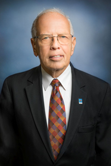
Racism and Health Equity in the Time of COVID-19
By John Baackes
CEO
L.A. Care Health Plan
Original Publish Date: October 6, 2020
Watching George Floyd die with a police officer’s knee on his neck shocked the nation and, understandably, set off weeks of protest. For Black Americans, that May incident was all too familiar. They took to the streets, joined by supporters from all communities, shouting ENOUGH and Black Lives Matter. The President of the American Psychological Association said,, “We are living in a racism pandemic,” and it is taking a toll on the health of Black Americans. The “racism pandemic” has collided with the COVID-19 pandemic, and it has put a spotlight on the truth that many are only now realizing – racism is a public health crisis.
It is not a new concept, but it has certainly gained more attention since the killing of George Floyd. The World Health Organization defines public health as “the art and science of preventing disease, prolonging life and promoting health through the organized efforts of society.” But, systemic racism impedes these efforts.
There are many examples where systemic racism undermines societal efforts to prevent disease, prolong life or promote health. Otherwise, why would African American children have higher rates of lead poisoning? Why do Black men continue to have a substantially lower life expectancy than White men? Why are Black and Native American women more likely to die from pregnancy-related causes than White women? The disparities go on and on.
Public health experts have long known that stress experienced by people of color impacts their health, and one of the greatest stressors is systemic racism. Racism that can lead to a lack of education, employment, housing and transportation is a barrier to health equity. The psychological stress that develops because of unfair treatment can lead to poor physical health.
The Centers for Disease Control and Prevention (CDC) acknowledges that systemic health and social inequities have put many people of color at increased risk of getting sick and dying from COVID-19. The CDC says Black and Hispanic Americans each have more than twice the number of coronavirus cases than Whites, they each have more than four times the number of hospitalizations and Black Americans suffer more than twice as many deaths.
The numbers are disheartening, and they should serve as a loud call to action. We all have to work together to gain control over the COVID-19 pandemic, and it will take the same sort of work to end systemic racism. Clearly, it is not going to be easy. We have only been dealing with the COVID-19 pandemic for months. Our nation has been dealing with racism for centuries.
But, when it comes to public health, the health care industry can have an impact. People of color must be encouraged to consider a career in medicine, and medical schools must be better at teaching their students cultural awareness and sensitivity, as well as medicine. Research has shown that racial and ethnic diversity in the healthcare workforce will mean culturally competent care for people of color. By taking steps to build a more diverse workforce, we can begin to address some of the specific chronic illnesses and health conditions that are found in higher rates within communities of color – hypertension, diabetes, asthma, obesity.
Of course, those steps alone will not end the systemic racism that is also impacting public health. It is going to take a much bigger effort that must include self-examination and societal action.
I’m the CEO of L.A. Care Health Plan, the largest publicly operated health plan in the country. As a public plan that is not beholden to stockholders, we have been able to reinvest in our community to help address the barriers to health that often arise from systemic racism. Our grants have helped house individuals who are experiencing homelessness, individuals who are facing eviction, individuals who face food insecurity, and individuals who face other barriers to health equity. We recently launched a free online search tool, L.A. Care Community Link, that allows members and the community to find and connect with organizations that provide social needs support such as food and housing assistance.
In 2018, we also launched Elevating the Safety Net, a $155 million, five-year initiative to recruit high quality physicians to the Los Angeles County safety net. The initiative includes a scholarship program, and the vast majority of the 24 scholarship recipients to date are people of color who are committed to serving their own communities.
Since its inception in 1997, L.A. Care has held a mission, vision and values committed to “cultural diversity and the knowledge necessary to serve members with respect and competence.” And, not long after the George Floyd civil unrest began, our Board of Governors issued a Statement of Principles on Social Justice and Systemic Racism, which makes clear that L.A. Care does not tolerate racism or discrimination in any form, and denounces the systemic oppression of people of color in America.
The statement also outlines several steps the health plan is taking to address social justice issues in Los Angeles County, including launching an Equity and Resilience Initiative that will support community-based organizations working to mitigate the impact of health care inequities. L.A. Care also established an Equity Council which is focusing on equity issues and topics related to employees, members, the plan’s contracted provider network and vendors.
We have to work fast. The August shooting of Jacob Blake by police in Kenosha, Wisconsin, shocked the nation once again, and sparked even more protests. There simply have been far too many tragic endings to police encounters with Black Americans. The toll it is taking on Black communities, mentally and physically, is simply intolerable.
John Baackes is CEO of L.A. Care Health Plan, the largest publicly- operated health plan in the U.S.